Nearly 40% of Americans now have a side hustle—and that number keeps growing, according to a recent Bankrate survey. The sharing economy has become a go-to way to earn extra cash by renting out things you already own. But not all platforms are created equal, and more importantly, not all side hustles are right for everyone.
We’ll evaluate each platform for different aspects to consider, like earning potential, time commitment, risk, scalability, and payout speed, so you can choose the one that’s right for you.
Here’s a quick look at the sharing economy apps we analyzed:
- Airbnb: Rent out your spare room or rental property for short or long-term stays 💡Learn more
- Neighbor: Earn money by renting out unused space in your garage, driveway, basement, or land to neighbors who need storage or long-term parking. 💡Learn more
- Outdoorsy: Rent out your RV or campervan to travelers who want the experience without owning one. 💡Learn more
- Peerspace: Earn money by renting your home, backyard, office, or unique space by the hour for meetings, photoshoots, events, and more. 💡Learn more
- Turo: List your car for rent when you’re not using it and get paid for each trip.💡Learn more
_________________________________________
Table of Contents
💲 Marketplace with the highest earning potential: Airbnb
🕰️ Marketplace with the lowest time commitment: Neighbor
💵 Marketplace with the highest ROI: Neighbor
⚠️ Marketplace with the lowest risk: Peerspace
💳 Marketplace with the lowest upfront costs: Neighbor
📈 Marketplace with the most scalable earnings: Turo
💰 Marketplace with the fastest payout speed: Outdoorsy
______________________________________________________________________________________
Earning Potential: How Much Can You Make?
One of the first questions most people have about a side hustle is: “How much money can I actually make?” Your annual income from these platforms can vary widely based on factors like location, asset availability, demand, and how actively you manage your listings.
In the table below, we break down potential earnings according to:
- Potential Annual Earnings: This reflects what a typical host might earn based on current usage.
- Potential Lifetime Earnings: Estimates how much you could earn over time, especially if you scale up or optimize your listings.
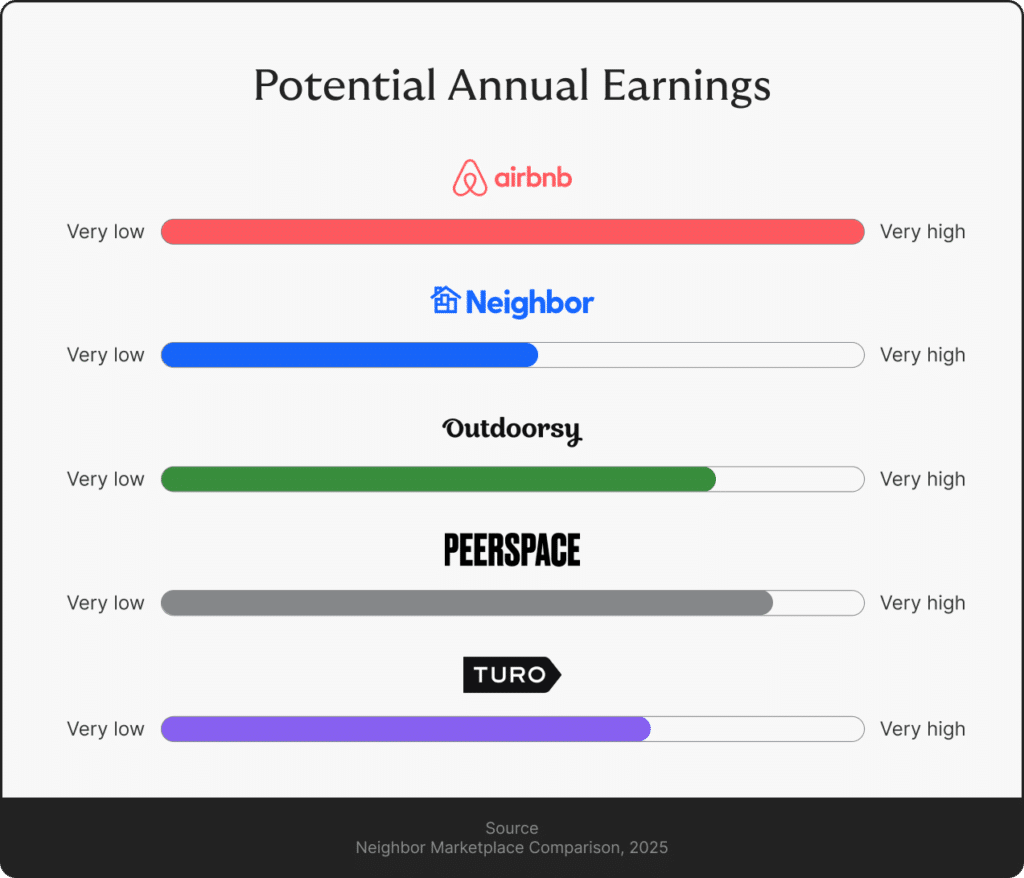
| Marketplace With the Highest Earning Potential | ||||
| Platform | Rank | Potential Lifetime Earnings | Potential Annual Earnings | Notes |
| Airbnb 🏆 | #1 | $$$ | $10k-$30k | Varies widely by location and property |
| Neighbor | #5 | $$ | $5k-$15k+ | Varies by location and space type |
| Outdoorsy | #3 | $$ | $7k-$25k+ | Experiences major seasonal peaks |
| Peerspace | #2 | $$$ | $8k-$27k+ | Best in urban and suburban areas |
| Turo | #4 | $$ | $7k-$20k+ | Varies by car type and location |
Airbnb
Airbnb ranks highest for earning potential, especially in tourist-heavy cities. A spare room might earn you $800/month, while a full unit downtown could bring in $3,000+/month. On average, hosts can earn $14,000. Location, pricing strategy, and quality of guest experience all play major roles in maximizing income.
Neighbor
With minimal effort, Neighbor allows you to earn passive income by renting out extra space for storage. A single garage or driveway might bring in $1,000–$3,000 annually, while hosts with 5–10 spaces or larger lots (especially near airports or HOA-restricted neighborhoods) can earn well into five figures. The type of item stored also matters—RV and boat storage often commands higher rates than boxes or smaller items.
Outdoorsy
Outdoorsy is ideal for RV owners looking to turn a seasonal asset into an income stream. Earnings spike around holidays and summer travel months, with some hosts making $5,000/month during peak season. Factors like RV size, features (e.g., solar, kitchen setup), and renter reviews all influence how often you’re booked. Keep your calendar open during high-demand periods and offer flexible pickup times to maximize your bookings.
Peerspace
Peerspace makes it easy to monetize unique or professional-looking spaces for events, photo shoots, and meetings. You’ll typically earn $50–$200+ per hour, depending on your location, setup, and the types of bookings you allow. Urban hosts and those with creative or versatile spaces (like lofts, studios, or backyards with good lighting) tend to earn more. Adding amenities like lighting gear or props can also boost your hourly rate and attract higher-paying clients.
Turo
Income depends heavily on the car’s make/model, condition, how often it’s available, and location. A reliable sedan might earn $7,000/year, while luxury or specialty vehicles in high-demand cities can bring in $20,000+ annually. Booking spikes around weekends and holidays, so making your car available during those times is key. Using features like contactless key exchange and maintaining a spotless car will also help you earn better reviews—and more repeat renters.
📋Recap
All of these platforms offer real opportunities to earn extra income—and the best part is, they’re designed to help you monetize what you already have. Whether it’s an unused garage, a car you don’t drive every day, a spare room, or a creative space, there’s a side hustle that fits.
Each platform can be profitable if you align your assets, availability, and effort with the right opportunity. Some require more time or investment up front, while others are incredibly passive—but there’s no “bad” option here. The key is to choose the platform that matches your lifestyle and goals, then optimize it to work harder for you.
Time Commitment: How Much Effort Does Each Platform Really Take?
Earnings only tell half the story. Time and effort can make or break a side hustle—especially if you’re doing this alongside a full-time job or other responsibilities. The frequency of turnover—how often you’re onboarding new renters or customers—can significantly impact how much time you’ll need to invest.
In the table below, we assess overall time commitment according to two factors:
- Monthly Time Investment: Is the estimated number of hours or minutes you’ll spend managing bookings, communication, and maintenance.
- Effort Level: This describes how physically or mentally demanding the work feels — whether it’s truly passive or requires ongoing, hands-on involvement.
These monthly time investment calculations are estimates. There are always ways to reduce the overall time commitment of a side hustle. For example, Airbnb hosts can outsource cleaning and guest communications to a third-party contractor. Just keep in mind: outsourcing saves time, but it also increases expenses.
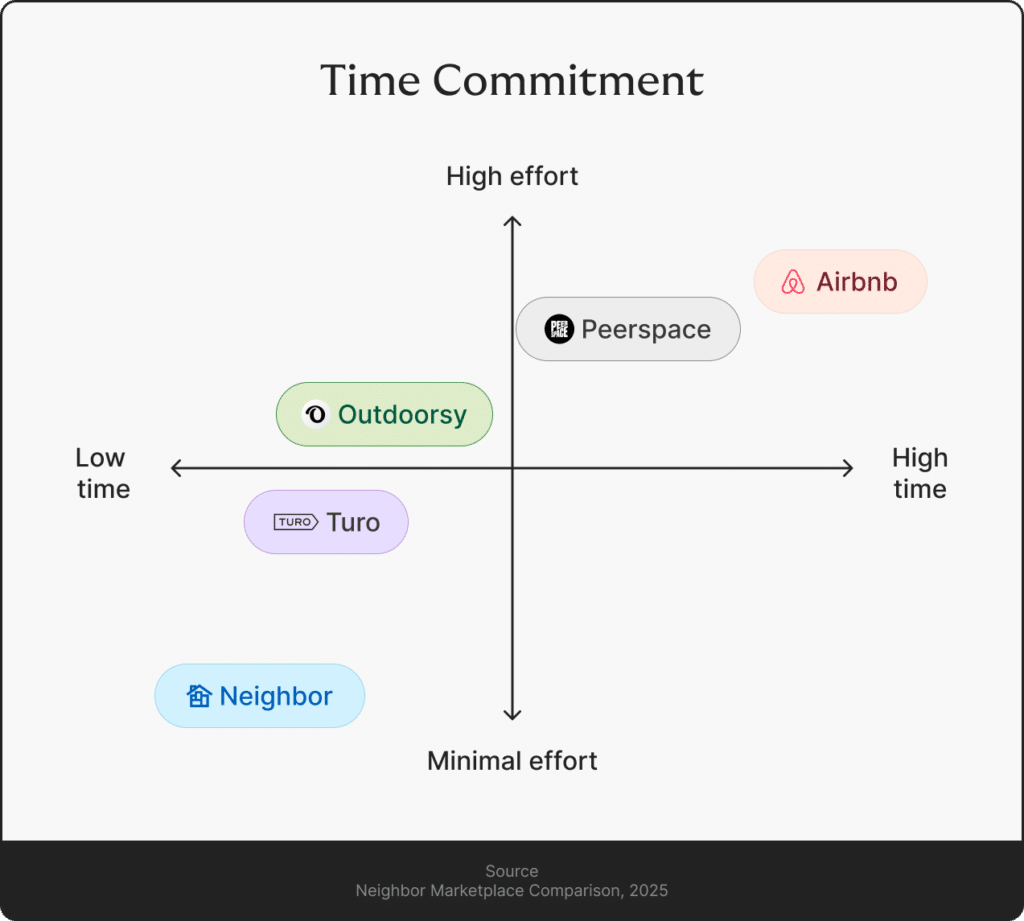
| Marketplace With the Lowest Time Commitment | ||||
| Platform | Rank | Monthly Time Investment | Effort Level | Notes |
| Airbnb | #5 | 10-20 hours | 💪💪💪 | Cleaning, guest communication, active management |
| Neighbor 🏆 | #1 | 0.5 – 2 hours | 💪 | Minimal management, very passive |
| Outdoorsy | #3 | 5-7 hours | 💪💪 | Detailed camper prep, renter walkthroughs before and after |
| Peerspace | #4 | 5-15 hours | 💪💪💪 | Pre-event communications, prep, post-event |
| Turo | #2 | 4-6 hours | 💪💪 | Car cleaning, handoff logistics |
Airbnb
Airbnb hosting can be time-intensive and may equate to the time spent on a part-time or full-time job if you oversee multiple properties. A GuestReady survey found hosts may spend 2–3 hours daily managing a single rental during peak periods, plus 5-8 hours per booking on cleaning days.
Hosts should expect to spend time on guest communication, cleaning (or coordinating cleaners), restocking, check-in/check-out, and addressing guest issues. Many hosts outsource cleaning and use automated messaging tools, which can cut time significantly — though at a cost to your net profit.
Neighbor
Neighbor is the most hands-off platform on this list. Since most renters stay for months or years at a time, you’ll rarely need to check in. And when you’re storing things like vehicles or boxes, there’s nothing to clean or restock—just coordinate a quick move-in or move-out when needed. It’s a great option for anyone looking for low-effort, passive income.
Outdoorsy
Outdoorsy requires more work per rental, as RVs require detailed cleaning and maintenance. You’ll need to clean and prep the vehicle, explain how everything works to the renter, and inspect the rig after each trip. Some hosts automate prep and handoff by hiring third-party services, but that eats into your take-home earnings.
Peerspace
Peerspace hosting requires a moderate amount of time and effort, typically ranging from 5 to 15 hours per month. Hosts spend time responding to guest inquiries, coordinating logistics, setting up the space, and cleaning between bookings. The time commitment can vary widely depending on your space and how hands-on you are with setup and turnover.
Turo
Turo hosts are expected to communicate with renters about pick-up/drop-off, ensure the car is clean and fueled, and manage key exchanges (or use lockboxes). A host should always account for the time it takes to meet the renter for key hand-off. On average, experienced hosts might spend an hour or two per rental on cleaning, handoff, and other admin tasks. There are some ways to cut back on that time, like Turo Go and lockboxes. Turo is still a relatively involved side hustle.
📋Recap
If you are trying to optimize for truly passive income, Neighbor is your best bet due to not having any ongoing work required. Turo and Outdoorsy require more hands-on effort—like vehicle prep, walkthroughs, and post-rental cleaning. Airbnb and Peerspace can be the most time-intensive, especially if you’re managing guest communication, setup, and cleanup yourself. You can outsource some of that work, but it usually comes at the cost of lower earnings.
Return on Investment: Which Platform Gives You the Best Value for Your Time?
Not all income is created equal—especially when you factor in time and effort. In this section, we take a realistic look at the earning potential of each platform compared to how hands-on it really is.
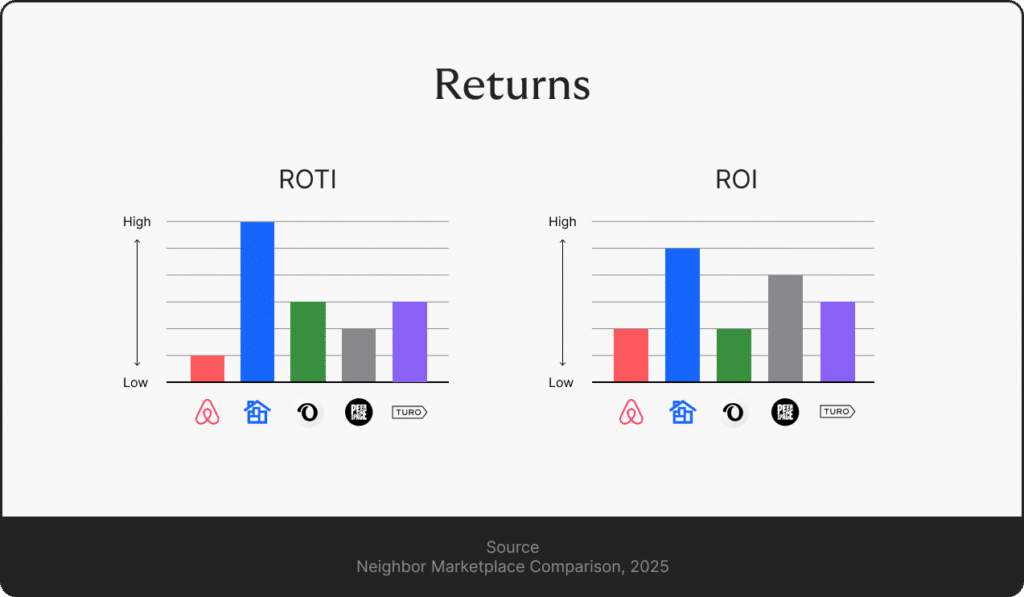
| Marketplace With the Highest ROI | ||||
| Platform | Rank | Potential Annual Earnings | Monthly Time Investment | Ongoing Cost |
| Airbnb | #5 | $800-$2,000+ | 10-20 hours | High ($300-$500) |
| Neighbor 🏆 | #1 | $500-$1,200+ | 0.5 – 2 hours | Very Low ($20-$30) |
| Outdoorsy | #4 | $500-$2,000+ | 5-7 hours | Moderate-High ($150–$300) |
| Peerspace | #3 | $800-$1,600+ | 5-15 hours | Low ($50-$150) |
| Turo | #2 | $500-$1,500+ | 4-6 hours | Moderate ($100-$250) |
Airbnb
Airbnb offers high earning potential, especially in high-demand markets, but it also comes with the most hands-on management. Between guest communication, cleaning, and upkeep, expect to put in consistent weekly hours. It’s best suited for hosts who don’t mind being actively involved—or who are willing to outsource parts of the work to keep things manageable.
Neighbor
Neighbor shines as one of the most passive income options. Most renters stay for several months, so after move-in, there’s very little ongoing involvement. With minimal time required and a strong average monthly payout, the return on effort is extremely high—especially if you have multiple spaces to rent.
Outdoorsy
Managing an RV rental takes effort—walkthroughs, prep, and clean-up are part of the routine. But the payout per booking is typically strong, and demand spikes during travel seasons. It’s ideal for RV owners who don’t mind a bit of active management.
Peerspace
Peerspace offers great earning potential for the time invested. While setup, communication, and cleanup are part of the deal, many hosts report strong earnings from just a handful of bookings per month.
Turo
Turo hits a sweet spot between effort and earnings. You’ll need to be available for vehicle handoffs (or use a lockbox), and you’ll handle cleaning and basic upkeep. But in many markets, a single car can earn a meaningful monthly income with just a few bookings, making it a worthwhile use of spare time or an underused vehicle.
📋Recap
Of course, all of these numbers can shift based on your specific situation—location, demand, the type of asset you’re listing, how much you invest upfront, and whether you outsource any of the work.
If your goal is to earn the most money with the least amount of effort, Neighbor might just be the ultimate side hustle. It’s the classic 80/20 rule: 20% effort, 80% of the reward.
But if you’re focused on total income and willing to put in the work (or build a system that relies on outsourcing), Airbnb offers the highest raw earning potential—especially if you scale with multiple properties.
In the end, the “best” side hustle is the one that aligns with:
- What you already have
- How much time you have to spare
- How involved you want to be

Risk: What Could Go Wrong, and How Much Can You Control?
Every side hustle involves some level of risk—whether it’s property damage, liability, or navigating awkward customer situations. But risk isn’t just about what might happen. It’s also about how much control you have to prevent, manage, or respond when things go wrong.
In this section, we compare two key factors:
- Risk Level: The likelihood or severity of something going wrong (e.g., damage, liability, disruption)
- Control Level: How much power you have to prevent issues, set boundaries, or intervene when necessary
For example, listing your car on Turo means handing over the keys and all control. Once the renter drives off, you have no oversight—if they get into an accident or damage the car, it’s out of your hands until the trip ends.
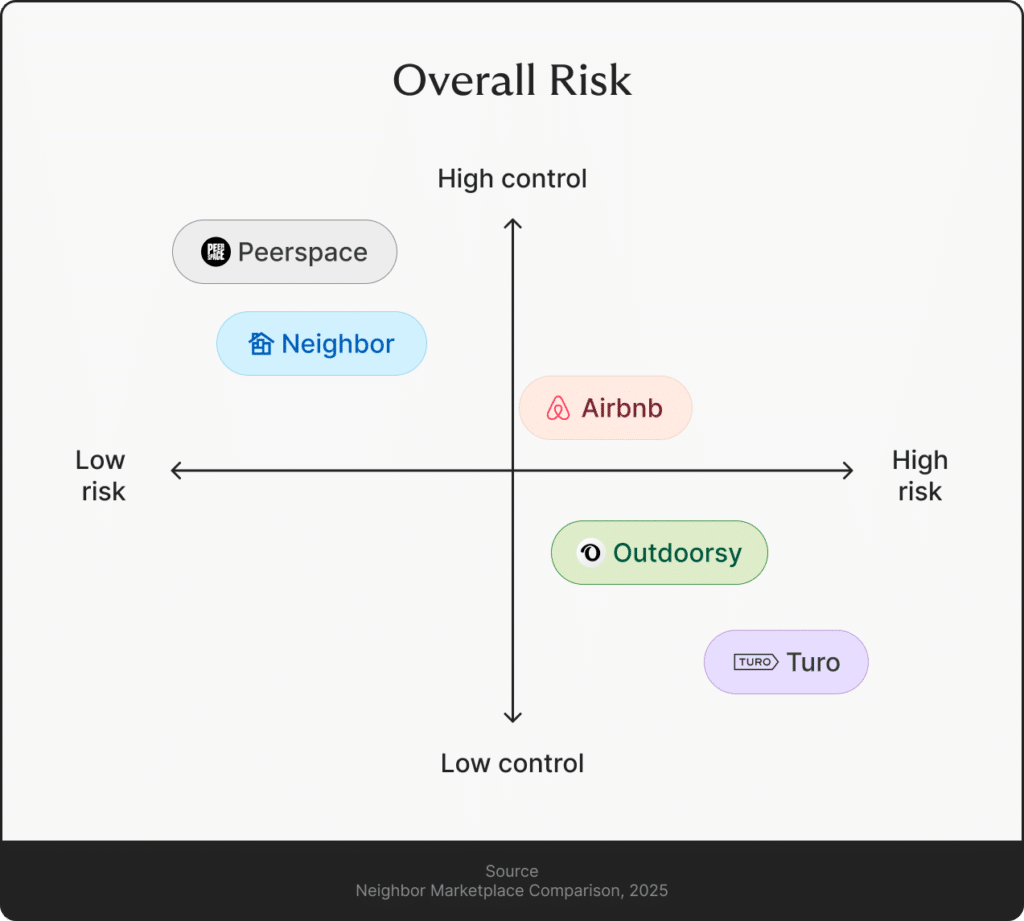
| Marketplace with the Lowest Risk | ||||
| Platform | Rank | Risk level | Control level | Why |
| Airbnb | #3 | Moderate | Moderate | Guests stay several nights in your property. You can set house rules, but you’re not there during the stay. |
| Neighbor | #2 | Low | Moderate | Renters store items and don’t access them frequently. You approve every booking and can reject any renter. |
| Outdoorsy | #4 | High | Low | RVs are high-value and used off-site. You can screen renters and get insurance, but can’t monitor the trip. |
| Peerspace🏆 | #1 | Low | High | Customer events often last 1–2 hours, and you can set rules and approve bookings. |
| Turo | #5 | High | Low | Renters drive your car for hours or days. Accidents, tickets, and late returns are risks you can’t control once it’s gone. |
Airbnb
Airbnb is relatively high risk. You’re inviting people into your personal space, often unsupervised. While rules and listing descriptions can help, you’re not there during the stay, so a number of things could happen without warning. Control is limited unless you live on-site.
Neighbor
The risk is low with Neighbor. Oftentimes, you’re not giving renters access to your living space—just letting them store their stuff in your unused spaces. You retain full control over who rents and what gets stored.
Outdoorsy
Outdoorsy carries moderate risk due to the high value of RVs and the lack of oversight during trips. While you can screen renters and use insurance, you can’t prevent all issues once they drive away.
Peerspace
Peerspace bookings are typically short and professional in nature. Oftentimes, corporate entities are using your space for photo shoots or business meetings, so guests will (generally) conduct themselves in a respectful manner. You also maintain full control over who books your space and when, which helps minimize the risk involved and protects your property.
Turo
Turo carries the highest level of risk. You’re handing over your personal vehicle, and once the renter drives off, you have no control over how it’s used. While Turo offers several protection plans to cover potential damage or liability, the level of coverage depends on the plan you select—and some hosts opt out entirely if they carry their own commercial insurance. Even with coverage, you may still be responsible for deductibles, repairs, or handling tickets and delays.
📋Recap
Every side hustle comes with some level of risk. The key is finding an opportunity where the potential rewards outweigh the potential stress. Choose a platform with safeguards that match your comfort level—doing a little homework upfront can lead to a lot less stress later.
Expenses: What Will It Cost You to Get Started and Keep Going?
No one likes high fees or surprise expenses that eat into their earnings. Most platforms charge hosts a fee—a percentage of each booking that helps cover the platform’s costs. On top of that, there are other expenses to consider, like startup supplies, cleaning, maintenance, or insurance, depending on the type of listing.
Below, we break down each platform’s core fees, typical upfront investments, and the ongoing costs you might incur as a host.
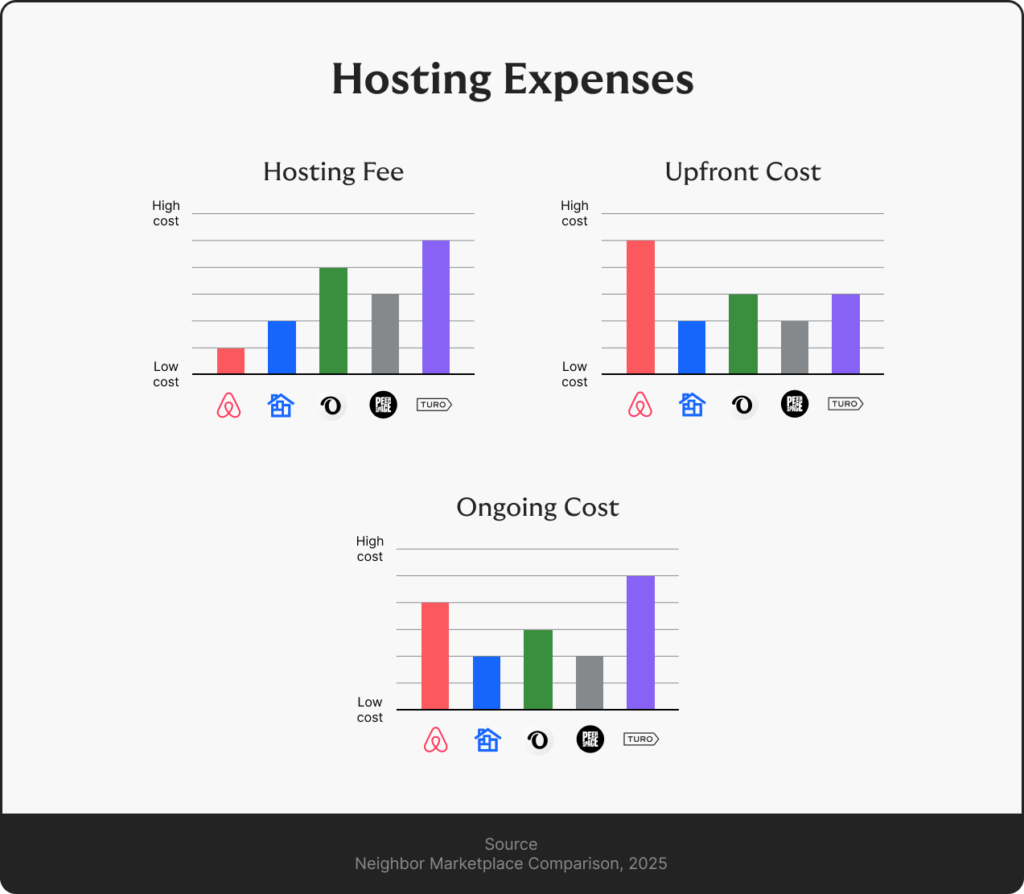
| Marketplace With the Lowest Expenses | ||||
| Platform | Rank | Platform Fee to Host | Upfront Cost | Ongoing Cost |
| Airbnb | #5 | Very Low (3%) | High ($3k-$5k) | High ($300-$500) |
| Neighbor 🏆 | #1 | Low (5%) | Low ($0-$100) | Very Low ($20-$30) |
| Outdoorsy | #4 | High (20%) | Moderate ($100-$200) | Moderate-High ($150–$300) |
| Peerspace | #2 | Moderate (15%) | Low ($0-$200) | Low ($50-$150) |
| Turo | #3 | Moderate to Very High(10% – 40%) | Moderate ($100-$200) | Moderate ($100-$250) |
Airbnb
Airbnb charges hosts a 3% fee per booking. However, the biggest cost is paid upfront during the setup process. Furnishing and prepping a full unit can easily run between $3,000–$5,000, especially if permits or upgrades are needed. Even a spare room might require $500–$1,000 for linens, décor, and essentials. Airbnb has the highest expenses accounting for all types of expenses, especially if you outsource cleaning, utilities, restocking, or maintenance.
Neighbor
Neighbor is the most affordable platform to get started with. The host fee is around 5%, and the upfront investment is often $0–$50. Many hosts don’t need to buy anything and will just list the space as is. Overall, ongoing costs are minimal. Occasionally, you’ll need to perform some routine maintenance like sweeping out a garage or trimming around the yard where vehicles are parked.
Outdoorsy
Outdoorsy charges hosts 20% of rental revenue (80/20 split). If you already own an RV, your startup costs will hover around $100–$200, which will cover prep supplies, cleaning tools, or a safety inspection. Monthly maintenance and insurance, however, can add up fast — around $275/month, depending on how often the RV is rented.
Peerspace
Peerspace charges a clear 15% host fee per booking. Initial upfront costs are minimal to moderate (typically $50–$200 for basic décor, cleaning supplies, or small aesthetic upgrades). Ongoing monthly costs include cleaning and maintaining the attractiveness of your space, averaging $50–$200 monthly.
Turo
Turo’s fees range from 10% to 40%, depending on the host’s chosen insurance/protection plan. The 60 plan offers comprehensive insurance with no deductible, while the 90 plan allows hosts to keep more revenue but with less coverage.
Ongoing costs include extra insurance (optional), vehicle maintenance, and depreciation. Our analysis estimates $125 upfront for items like a spare key and cleaning supplies, and around $200 per month for ongoing insurance and maintenance.
📋Recap
High earnings are great—but what matters most is what you keep. While Airbnb has the highest revenue ceiling, its startup and maintenance costs can be steep. Platforms like Neighbor may bring in less each month, but with minimal investment and overhead, they often deliver on net returns.
Scalability: How Much Can You Increase Your Earnings Over Time?
Some side hustles offer limited growth, while others can scale into high-earning operations. Scalability refers to how easily you can increase your income—whether that’s by adding more listings, upgrading your space, or offering premium amenities like EV charging or covered parking.
We evaluated scalability on three key factors:
- Time Investment: How much of your time is required to expand or manage growth
- Capital Required: The upfront cost to scale (e.g., buying more gear, upgrading space, or listing more properties)
- Demand Level: How strong the ongoing market demand is (do people consistently want what you’re offering, and is there room for more?)
Here’s how the platforms compare:
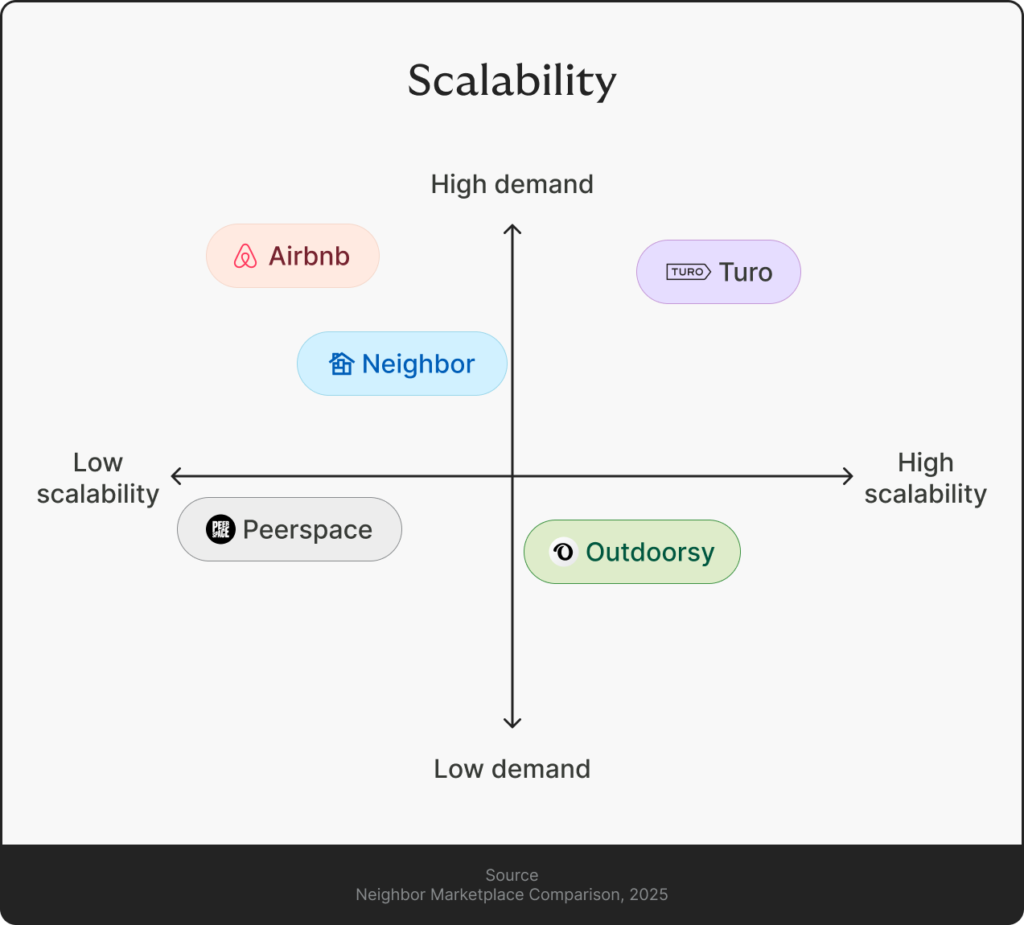
| Marketplaces Ranked By Scalability | ||||
| Platform | Rank | Scalability Potential | Demand level | Why |
| Airbnb | #4 | Difficult | High | The global short-term rental market exceeds $1T/year — but competition is steep. |
| Neighbor | #3 | Moderate | Moderate | 1 in 9 Americans use storage monthly; the industry is worth over $500B. |
| Outdoorsy | #2 | Moderate | Low | The RV rental market is strong, especially during summer travel seasons. |
| Peerspace | #5 | Difficult | Moderate | Can attract a wide range of events, from photo shoots to baby showers. |
| Turo 🏆 | #1 | Easy | Moderate | Car-sharing is growing, especially in urban areas, but supply is rising fast too. |
Airbnb
Airbnb has enormous global demand. The short-term rental and hospitality space exceeds $1 trillion annually. However, it’s the hardest to scale due to high upfront costs, intense competition, and the need for constant hands-on management.
Neighbor
Neighbor offers scalable, passive income by listing multiple spaces. One in nine Americans uses storage each month, and the U.S. storage market is worth over $500 billion. To put that into perspective: the average acre of land can fit up to 144 standard parking spaces.
Outdoorsy
Outdoorsy is scalable if you have access to multiple RVs or campervans. The RV rental industry sees strong seasonal demand, specifically among road-trippers and vacationers, but requires capital and effort to grow sustainably.
Peerspace
Demand for hourly space rentals can be lucrative—especially in cities—driven by photo shoots, events, and business meetings. You can scale your income by adjusting your pricing, opening your space to different types of bookings, extending your availability, or adding more spaces to your portfolio over time.
Turo
Turo is highly scalable: you can easily add more cars, streamline handoffs, and run it like a rental business. Demand is solid in urban markets, but supply has surged in recent years, meaning more competition for bookings.
📋Recap
Scalability comes down to how far you want to take your side hustle. Some platforms are easy to expand. If you’re thinking long term, look for platforms that give you room to scale at your own pace, whether that’s through physical expansion or simply offering add-on services that boost your earnings.
Payout Speed: How Fast Do You Get Paid?
Some side hustles offer near-instant gratification, while others pay out slower. Depending on your goals, cash flow speed may matter a lot. Assuming you connect your bank account to your profile, here’s how fast you can expect to get paid out:
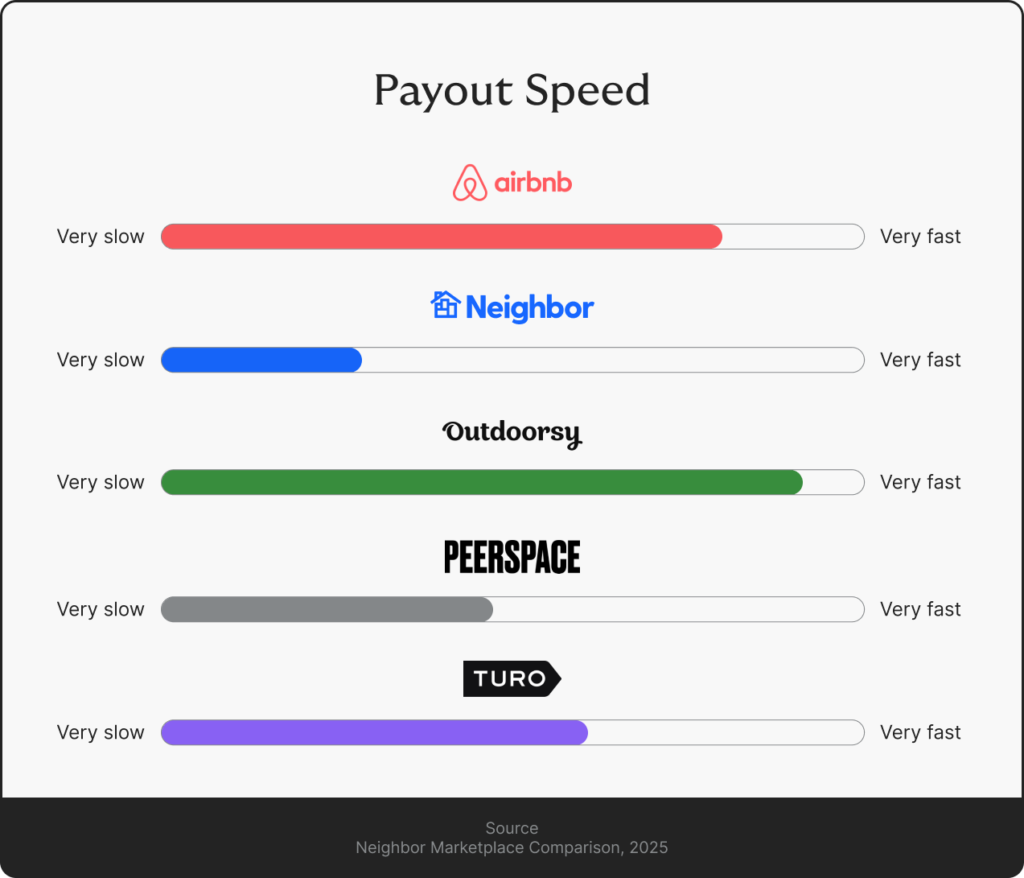
| Marketplace With the Fastest Payout Speed | |||
| Platform | Rank | Payout speed | Why |
| Airbnb | #2 | 3-5 days after check-in | Airbnb has a variety of payout options to fit your needs, and payout speed will change depending on what you choose. |
| Neighbor | #5 | Monthly | Since it’s a month-to-month agreement, payment comes 1 month after the reservation starts. |
| Outdoorsy 🏆 | #1 | Within 24-48 hours after the trip ends | Quickly get paid within 48 hours of the renter returning the RV. |
| Peerspace | #4 | 3-7 days | Payout takes approximately 5 days after a service is completed |
| Turo | #3 | 3–5 days after the trip ends | Still fairly quick, with some delay. |
Airbnb
After Airbnb releases your payout, there’s a processing time before the money arrives in your payment provider. Typically, it’s 3-5 days after check-in, but it can be faster depending on the payout option you choose.
Neighbor
Because Neighbor operates on a month-to-month rental model, hosts are paid monthly. You need to wait around 30 days after the reservation begins to get paid.
Outdoorsy
Hosts are paid within 48 hours of the renter returning the vehicle, ensuring quick access to funds while also protecting against potential damage claims during the rental period.
Peerspace
Payments from Peerspace process your funds 72 hours after an event finishes.
Turo
Turo issues payouts 3–5 business days after the trip ends, offering relatively fast access to earnings while allowing time for post-trip reviews and issue resolution.
📋Recap
The payout speed is determined by factors like the length of stay and your payout method’s processing time, and will decide when the funds arrive in your account. Expect to be paid after the service is provided—or at least after it begins. If quick cash flow is a priority, take a closer look at each platform’s payout schedule.
Choosing the Right Side Hustle: What to Keep in Mind Before You Get Started
There’s no perfect platform for everyone—each one has its own trade-offs. Your ideal side hustle depends on your goals, lifestyle, and what you already have to work with. These platforms are just tools; how you use them makes all the difference. Here are a few tips to help you get started:
- Use what you already have: Extra space (Neighbor), car (Turo), or spare room/property (Airbnb).
- Consider your time and lifestyle: Busy schedule? Pick passive income like Neighbor. Airbnb requires significant effort and flexibility.
- Calculate true costs: Do a quick profitability check before starting—compare income with potential expenses.
- Make your listing stand out: High-quality photos, clear descriptions, and prompt responses maximize bookings and earnings.
- Learn from others: Join host communities and use platform-provided guides to avoid pitfalls and boost income.
Ultimately, each platform can work in your favor, depending on how you use it. Whether you’re building a long-term income stream or just trying to make a little extra on the side, aligning your time, assets, and goals is the real key to success.
The post Comparing the Top Marketplaces: Earn Income from Things You Already Own appeared first on Neighbor Blog.